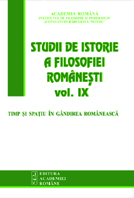Ioan Petru Culianu, Mircea Eliade şi felix culpa
Ioan Petru Culianu, Mircea Eliade and felix culpa
Author(s): Liviu BordaşSubject(s): Philosophy
Published by: Editura Academiei Române
Keywords: Mircea Eliade; Ioan Petru Culianu; Mac Linscott Ricketts; Adriana Berger; Vittorio Lanternari; the Iron Guard; Fascism; anti-Semitism
Summary/Abstract: The article discusses Culianu’s attitude towards the accusations of philo-fascism and anti-Semitism brought to Eliade since the 1970s, and especially after his death (1986). Among the burdens which he assumed as part of the inheritance from the master was that of clarifying his interwar political involvement and of showing the lack of foundation for the faults of which he was being accused. Besides the texts published by Culianu on this topic which have already been discussed, we have introduced several new elements: 1. his correspondence with an American pupil of Eliade and the best of his biographers, Mac Linscott Ricketts (published in the Appendix 1 to the article); 2. his direct and indirect relationship with another Romanian disciple of Eliade, Adriana Berger, on the basis of her correspondence with their common master (published by us elsewhere) and with M. L. Ricketts (to be published soon); 3. Culianu’s lesser known and even less discussed writings about the felix culpa of Eliade (one of them published in the Appendix 2 to the article). Contrary to what some authors have argued about the attitude of “the last” Culianu toward his maestru, these sources show him preoccupied with defending Eliade from false accusations of the detractors, just as in his earlier articles. He rejected the allegation that Eliade became a member of the Iron Guard and argued that his sympathy for the Legion (considered a movement of spiritual and moral reform) was the result of a political naïveté without consequences. He also denied the existence of any philo-fascism and anti-Semitism in his political and scholarly options, during those years or in the following ones. Nevertheless, despite this clear evidence, we consider that the question of Culianu’s attitude toward the felix culpa of Eliade remains still open. Only the publication of the whole of Culianu’s manuscripts, of his journal, and his correspondence, will enable us to reach safe conclusions on this subject. Until then, it should be hoped that the discussions will take into account not only all the data of the problem, but also all its indeterminates – a thing which, regrettably, has been seen rather rarely in the two decades elapsed since Culianu’s death.
Journal: Studii de istorie a filosofiei româneşti
- Issue Year: IX/2013
- Issue No: 09
- Page Range: 319-378
- Page Count: 60
- Language: Romanian

